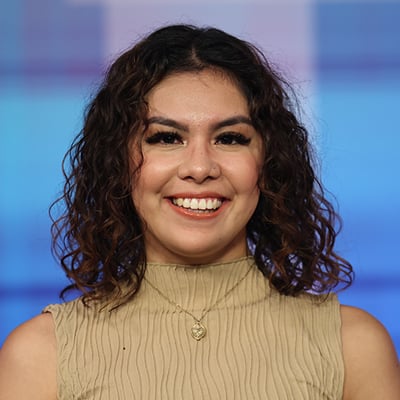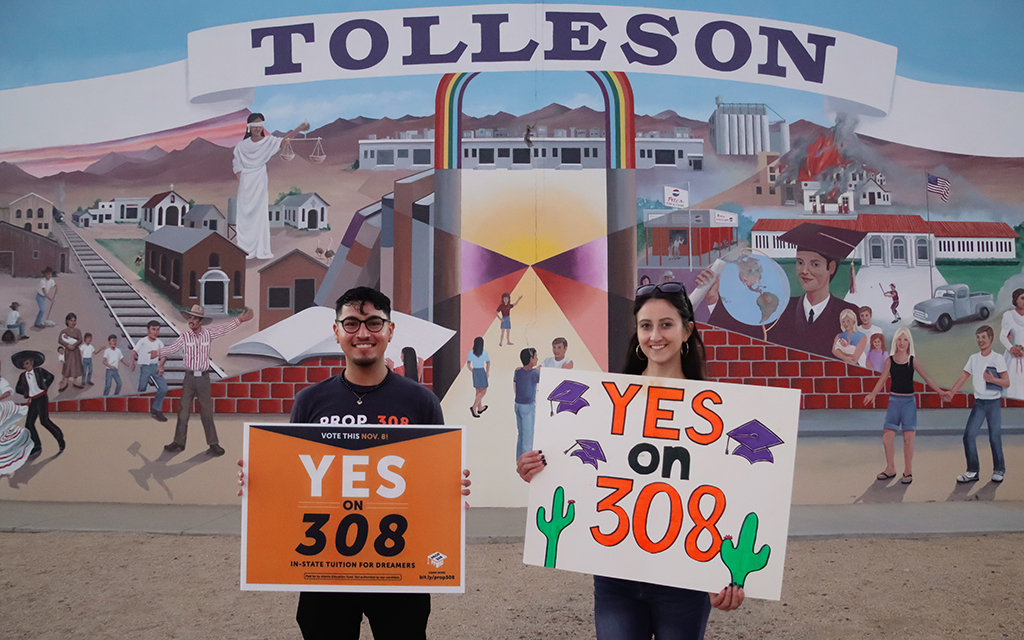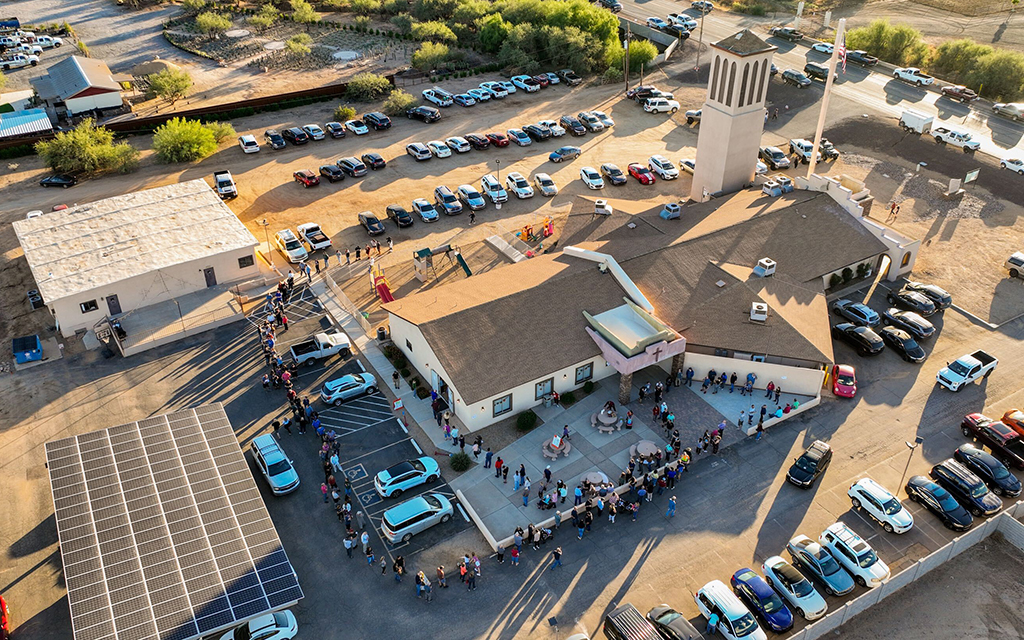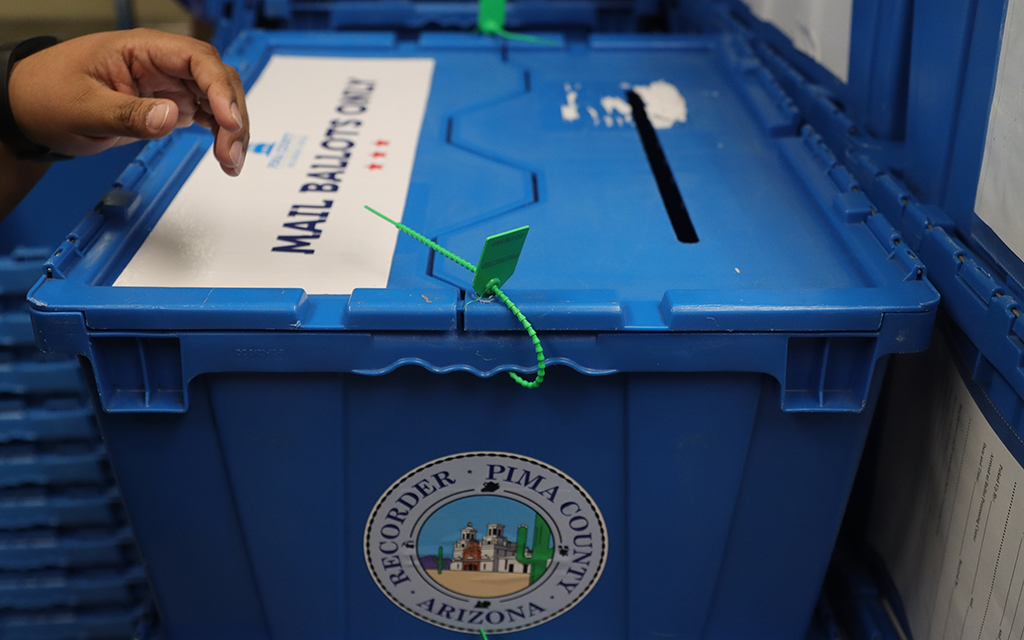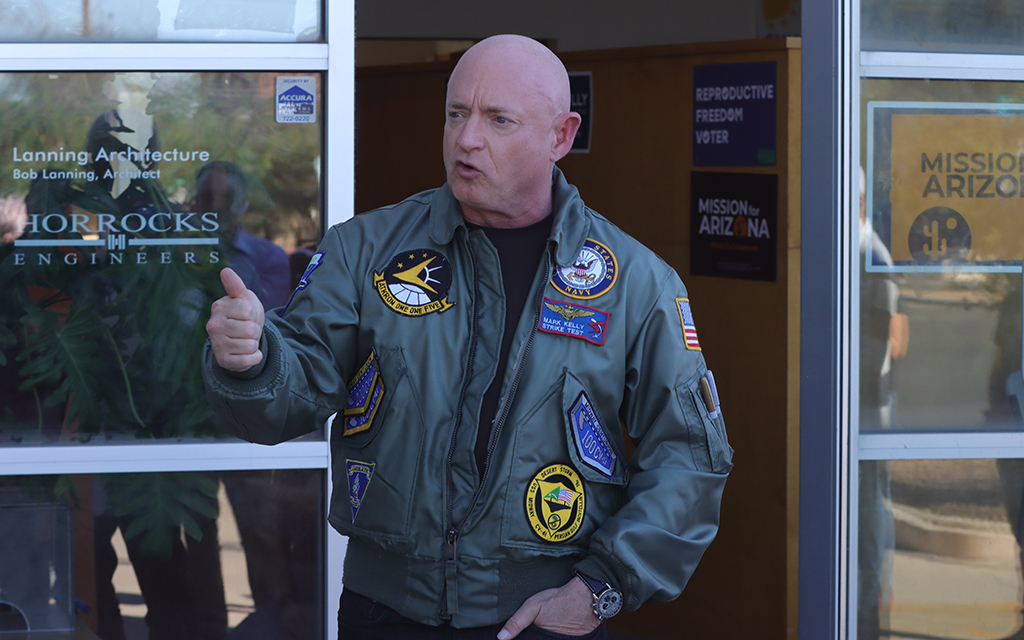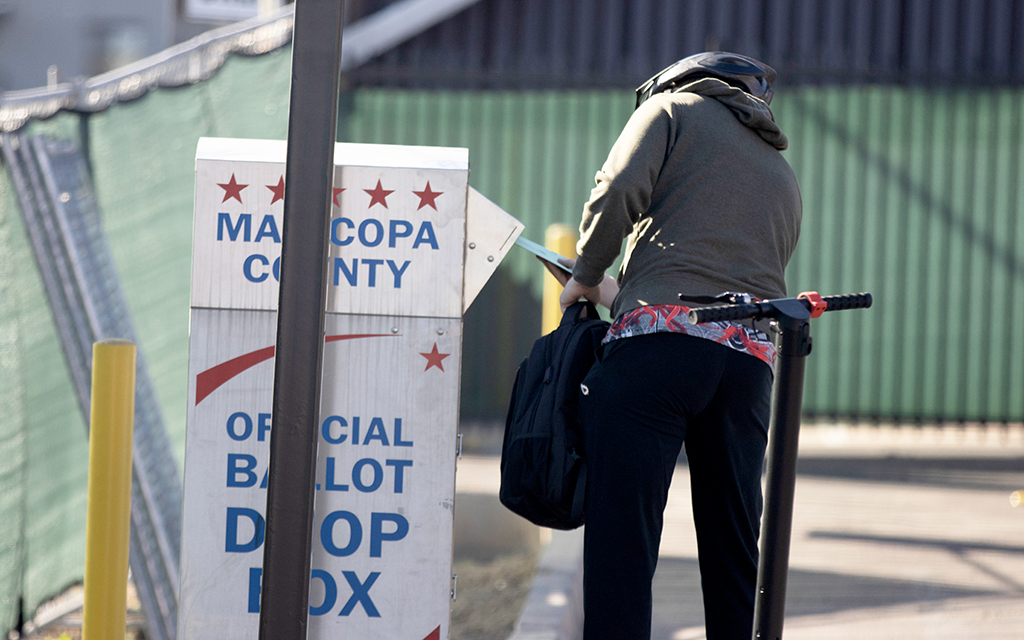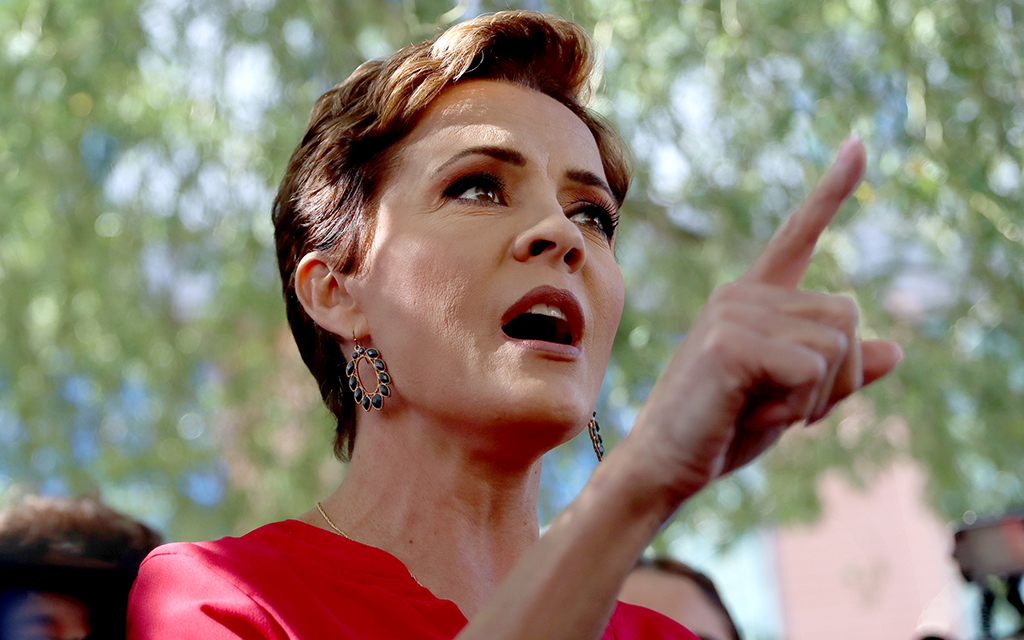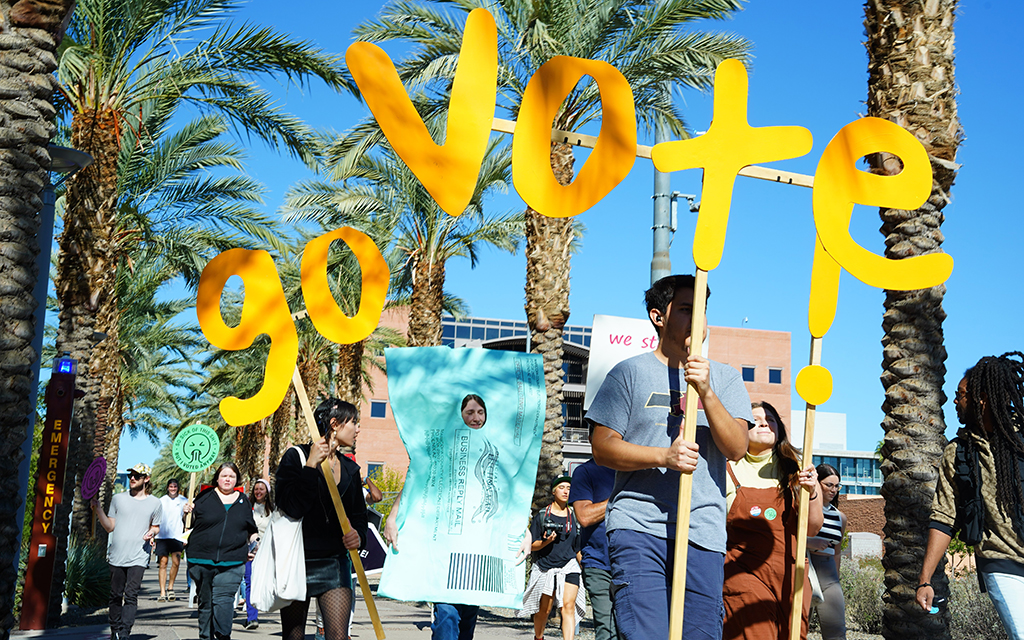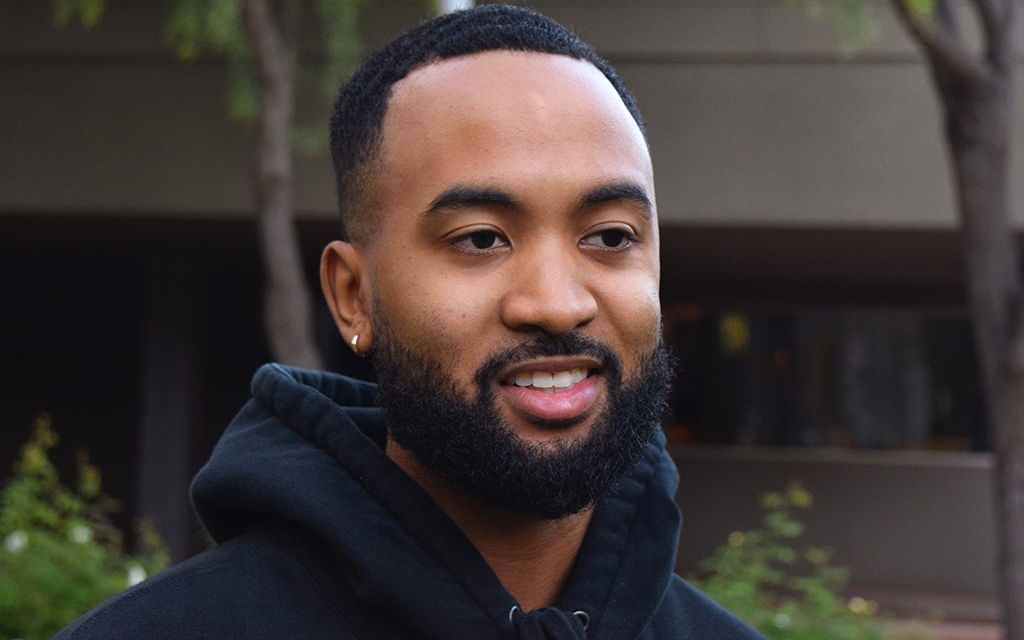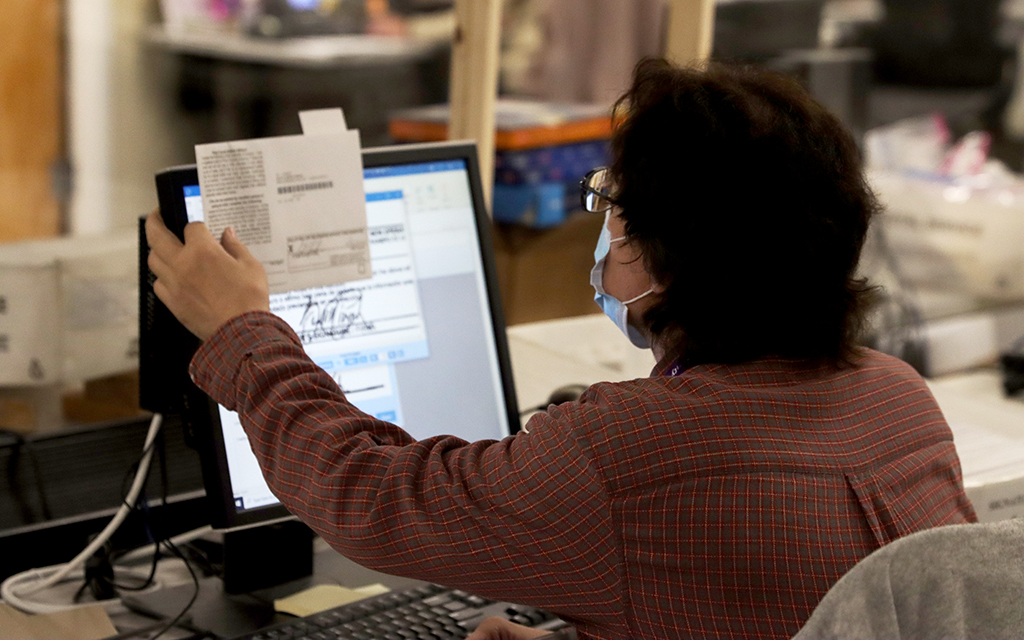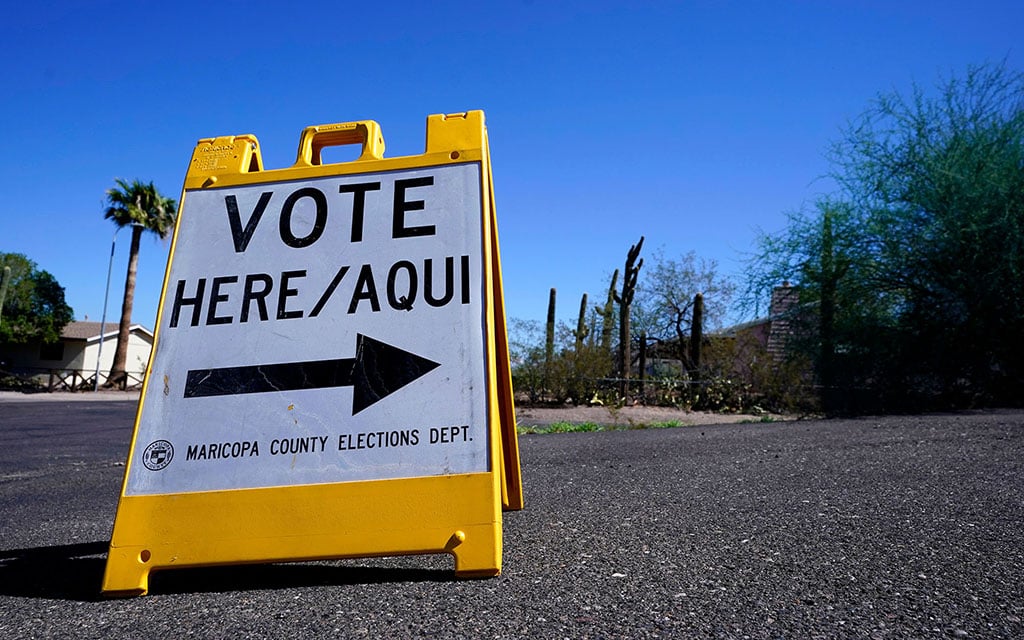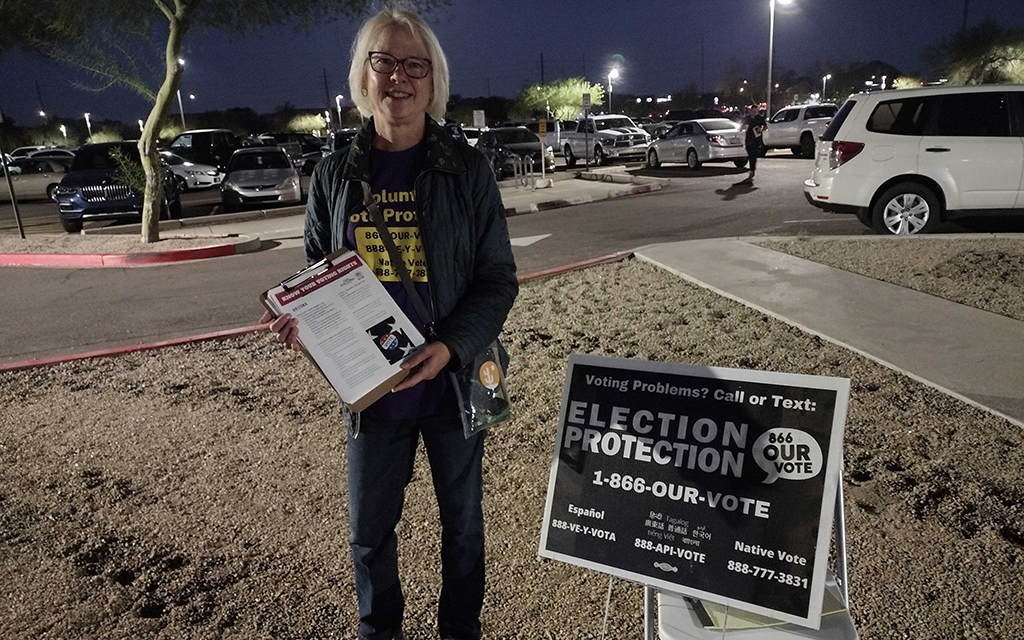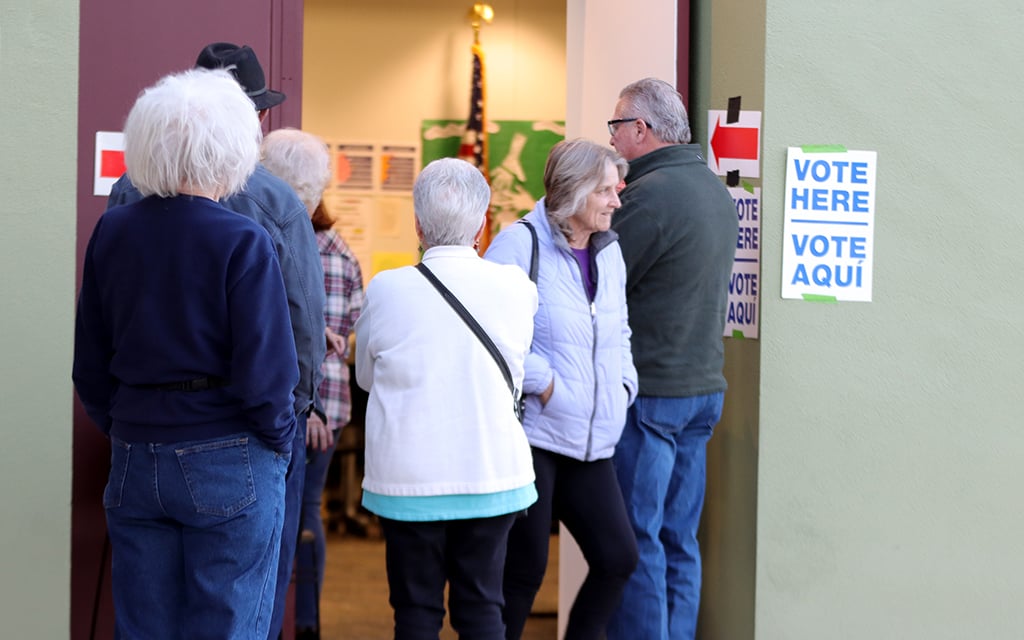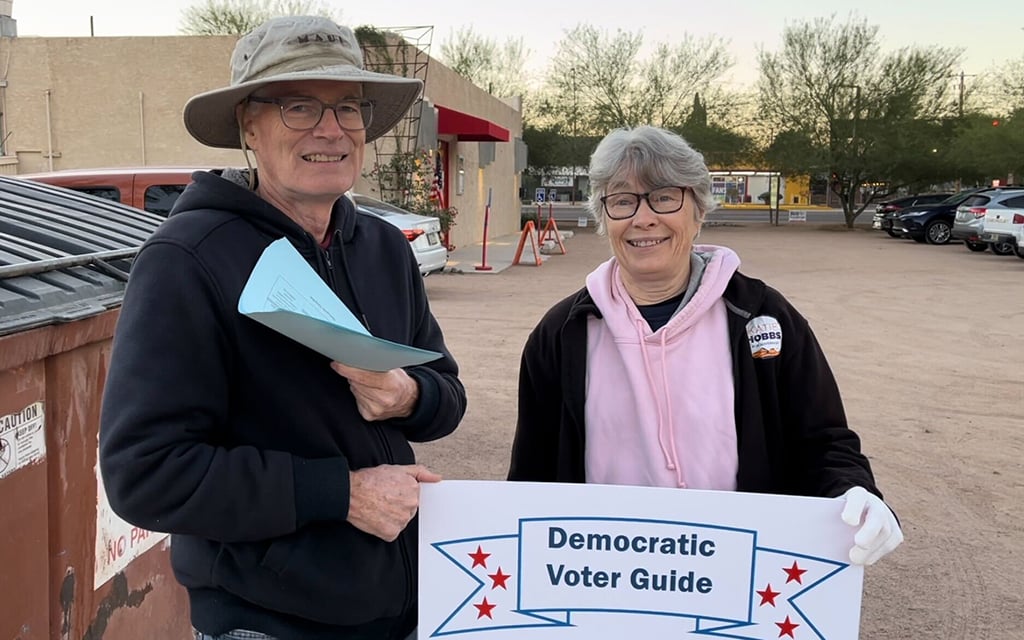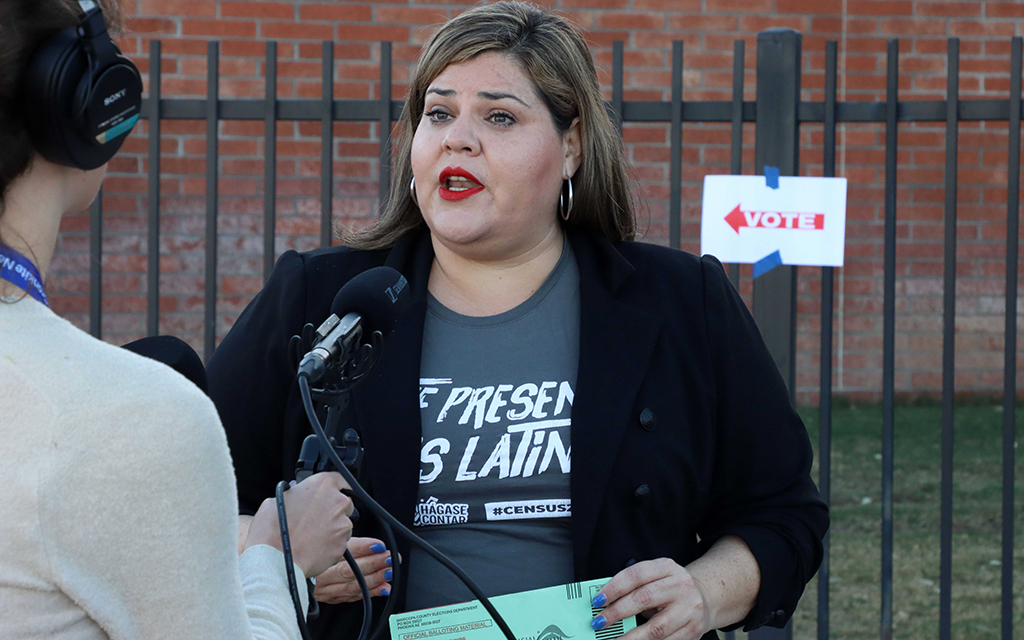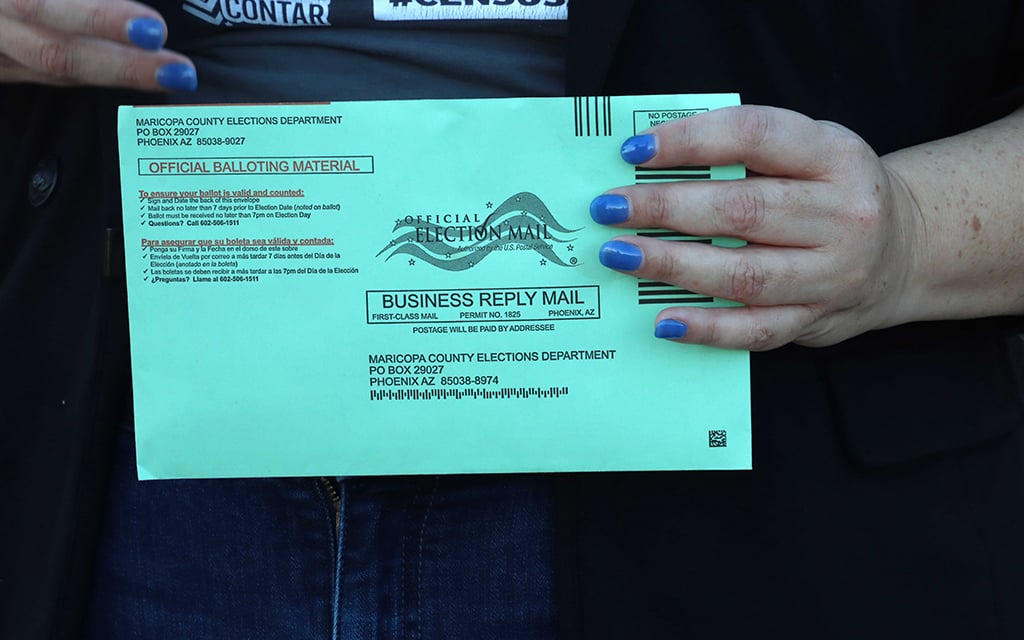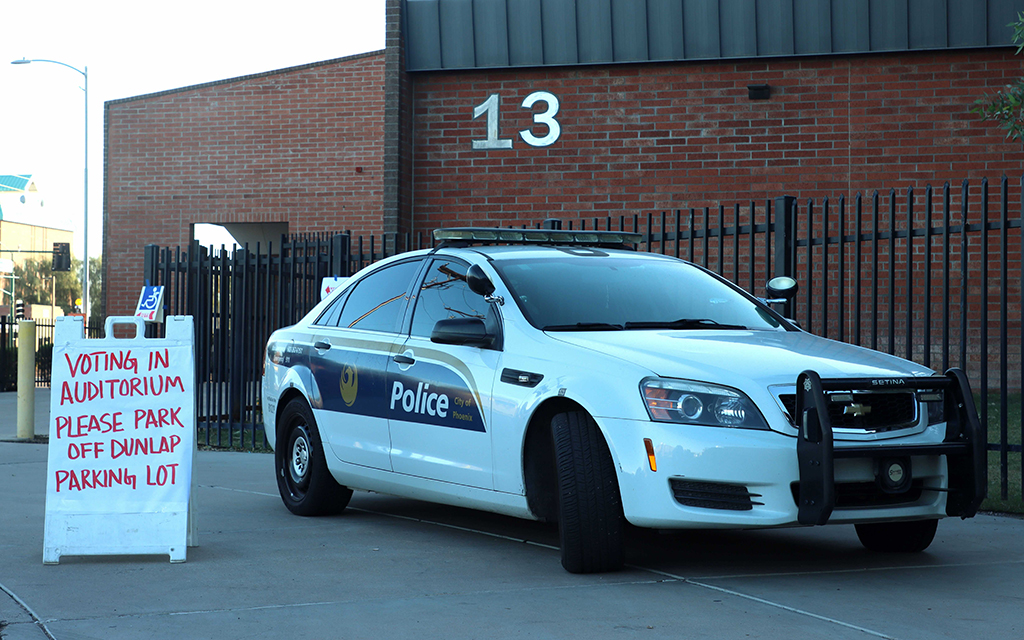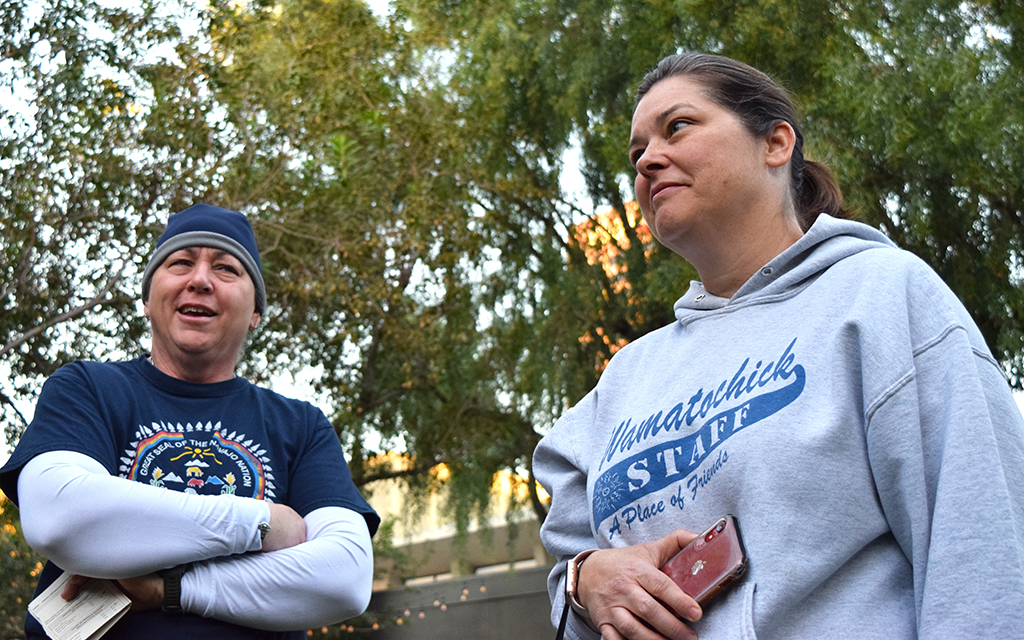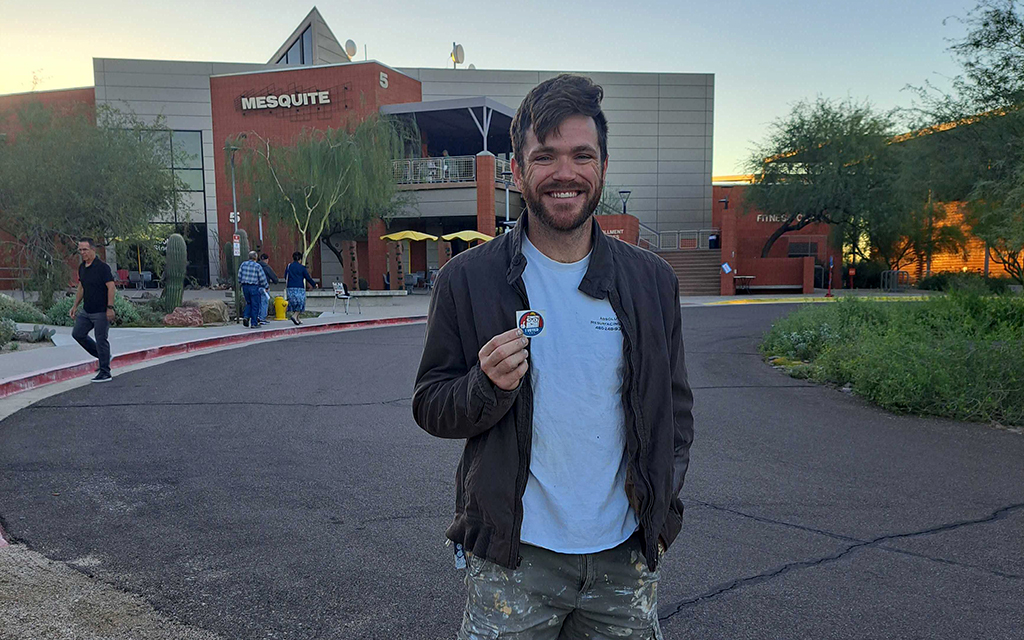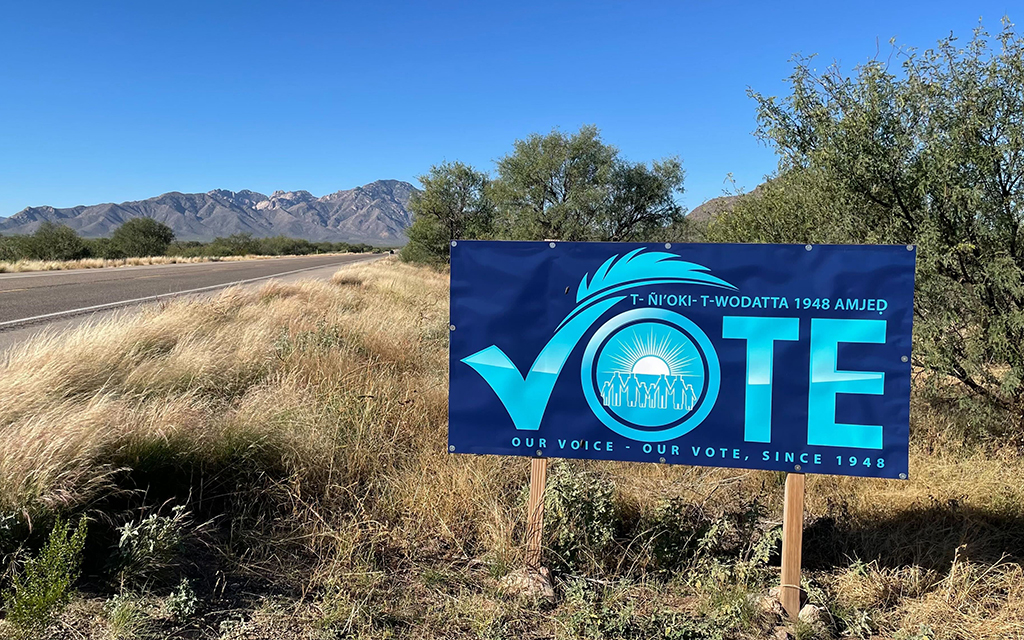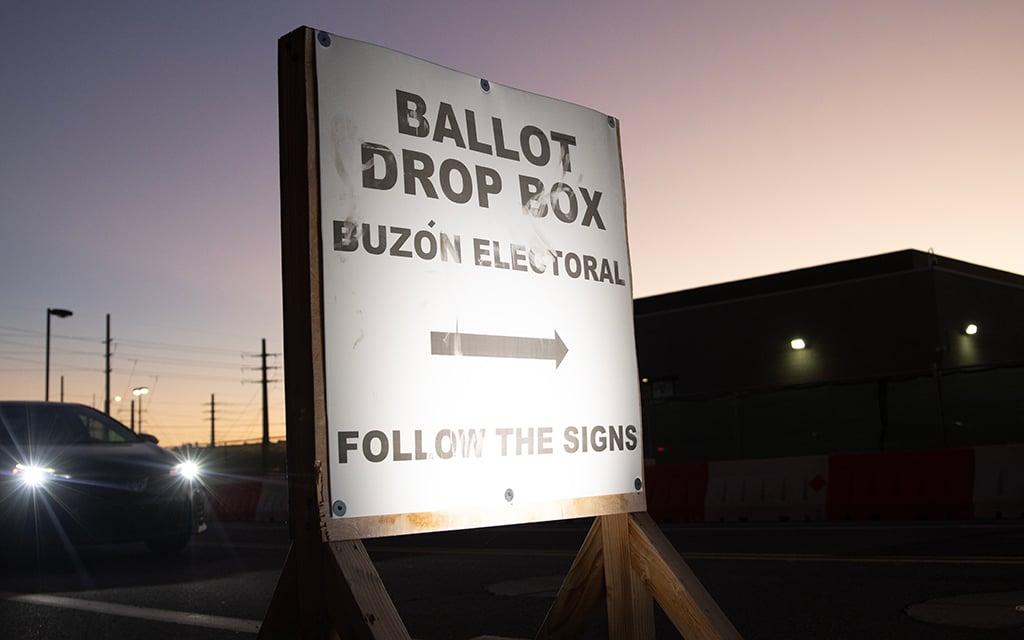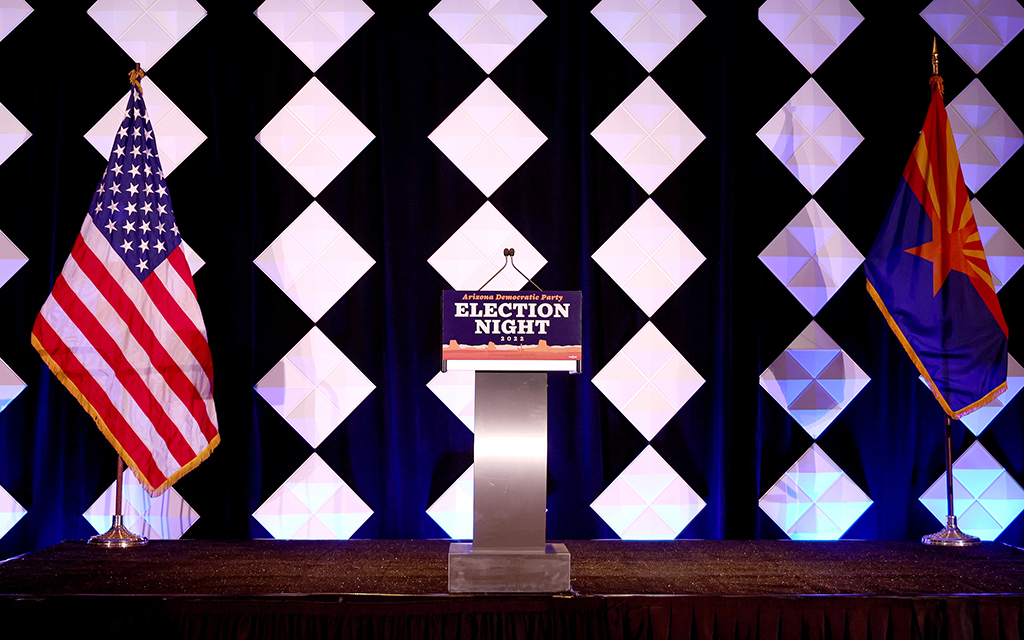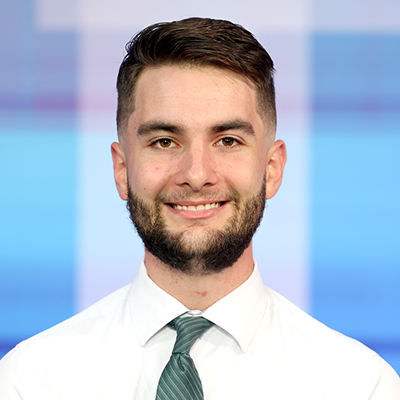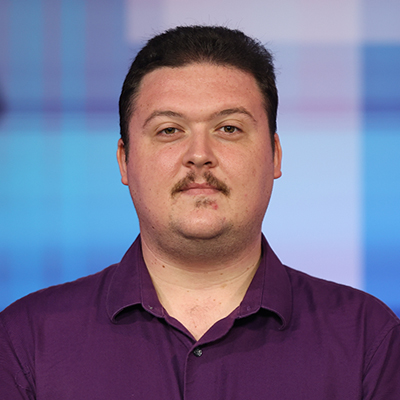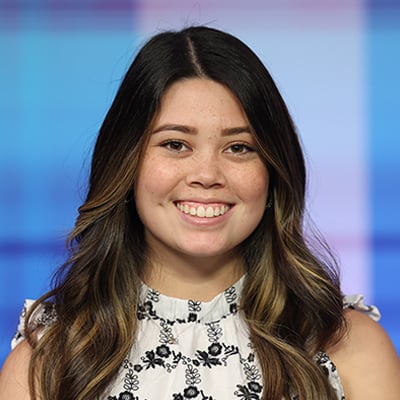PHOENIX – Voters across Arizona headed to the polls Tuesday to choose leaders for key statewide and federal offices, and decide a slew of propositions that will chart the state’s course over the coming years.
The 2022 midterms arrive at a time of high tensions between increasingly polarized political parties, and it’s playing out against the backdrop of widely disproven claims that the 2020 presidential election was stolen from Donald Trump.
Here are updates from around Arizona on Election Day:
Voters cast ballots as polls close in Arizona
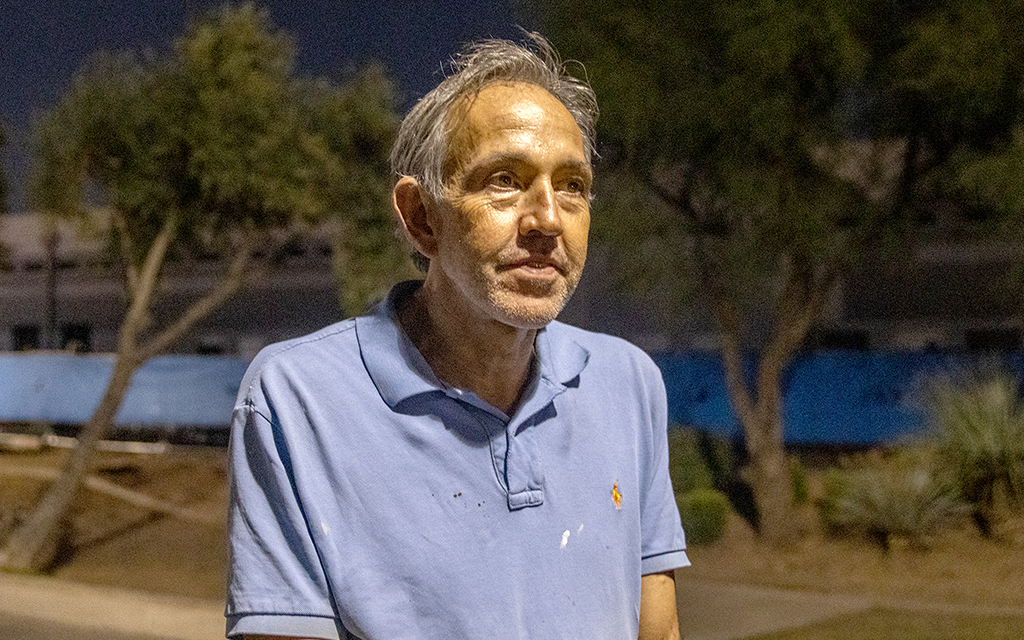
William St. James, 58, leaves the polling place at Living Word Church in Ahwatukee Foothills after waiting in line to vote for more than an hour and a half. (Photo by Emily Mai/Cronkite News)
William St. James, 58, and Michelle St. James, 60, cast their ballots at Living Word Church in Ahwatukee Foothills. It took them more than 90 minutes.
The two had tried to vote about noon, but the line was too long, and William had to return to work. They said they hadn’t waited in such a long line in previous elections.
Both were concerned about the economy and said their top concern was bringing down inflation. Michelle St. James believed the economy is tied to other issues, like undocumented immigration, and said that “we need to take care of our own people first,” citing high rates of homelessness.
She immigrated from Iran in 1984 after the country’s Islamic Revolution.
The economy was a key issue for other voters, including Daniel Barba, 63, who was in line before 7 p.m. He said he “leans more libertarian” and feels that the U.S. government is spending too much money. He also said there was a solution needed at the southern border, but that it shouldn’t be completely closed.
“It seems like the parties are so far apart,” Barba said.
– Reporting by TJ L’Heureux
A range of issues send voters to the polls
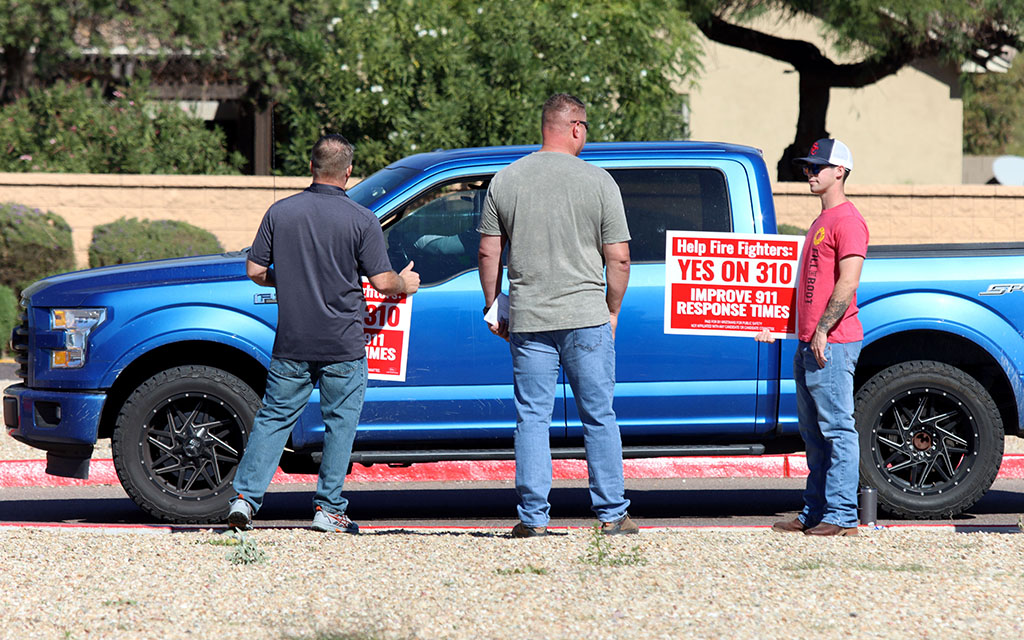
Firefighters wave to voters and hold signs in support of Proposition 310 at the Litchfield Elementary School District Support Services building, which is set up as a polling location in Litchfield Park on Election Day. Prop 310 would raise the state sales tax by a tenth of 1% for the next 20 years to build a new Fire District Safety Fund, which would be distributed to the 144 fire districts in the state. (Photo by Alexia Faith/Cronkite News)
The first release of election results won’t happen until about 8 p.m. in Arizona, but voters across the state have been showing up all day to drop off ballots or vote in person. In Maricopa County, voters say a variety of issues brought them out on Election Day – from rising inflation to key matchups, such as Arizona’s governor race. Several expressed they trust the in-person voting process more than mailing ballots early.
Some voters stood in long lines while others breezed in and out of voting centers. Voting has been steady despite tabulation issues at 60 centers in Maricopa County Tuesday. County officials said that by early afternoon, a fix had been rolled out to some of the machines, with the rest in progress. Cronkite News reporter Natalie Skowlund caught up with several voters at polling places in the Valley to capture their stories through sound.
Menudo and coffee served up for Election Day on Tohono O’odham Nation
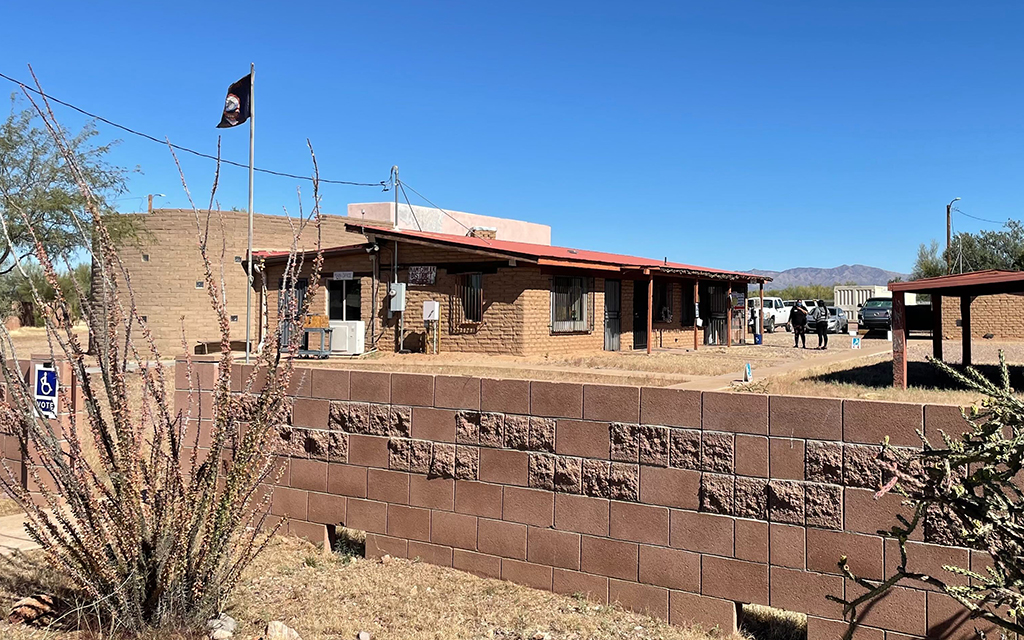
The Baboquivari District Office is among the places to vote on the Tohono O’odham Nation. (Photo by Noel Lyn Smith/Special for Cronkite News)
There were no lines to vote at the Baboquivari District Office along Indian Route 19 on the Tohono O’odham Nation. But in Sells, voting activity was steadier.
Employees of the Sells District Office served menudo and coffee from a large tent in a nearby parking lot to tribal members who voted or stopped by. Each of the tribal government offices in Pima County are voting locations for Election Day.
The tribal land is in Pima, Pinal and Maricopa counties.
– Reporting by Noel Lyn Smith/Special for Cronkite News
Volunteer poll protectors work to reassure voters
The Islamic Community Center in Phoenix is “not busy” but has voters “constantly in and out,” according to Marc Pruzansky.
Pruzansky greeted voters as he leaned against a palm tree by the parking lot, 75 feet away from the poll.
He is a volunteer with Election Protection, a national nonpartisan organization working to ensure everyone has the right to vote. The organization helps answer voter questions and concerns and urges voters to call or text 866-OUR-VOTE (866-687-8683) to speak with a trained Election Protection volunteer.
Earlier that day, a volunteer working with Pruzansky reported issues when a counter went down at another polling location. Some voters chose to go to different locations amid concerns that their votes would not be counted.
– Reporting by Haley Tenore/Special for Cronkite News
Kari Lake casts ballot, pledges election reform if elected Arizona governor
After casting her ballot in downtown Phoenix, a confident Kari Lake attacked the news media and pledged election reform if she wins the race for Arizona governor.
“We’re going to win,” Lake said, though she noted she had little confidence in the election process. “I’m just not confident in the people we’ve elected to run these elections. … We will bring about good, honest reform to our elections.”
Lake, who was endorsed by former President Donald Trump, is one of the prominent Republicans who have built their campaigns on denying the results of the 2020 presidential election.
Lake also attacked the media she spoke to and said they, too, needed reform.
“It’s gonna be a fun eight years,” she told them, predicting she would win not only one, four-year term but two. “I’m going to be your worst freaking nightmare.”
– Reporting by Kaden Kleinschmidt
No matter the obstacles, Surprise family keeps voting tradition alive
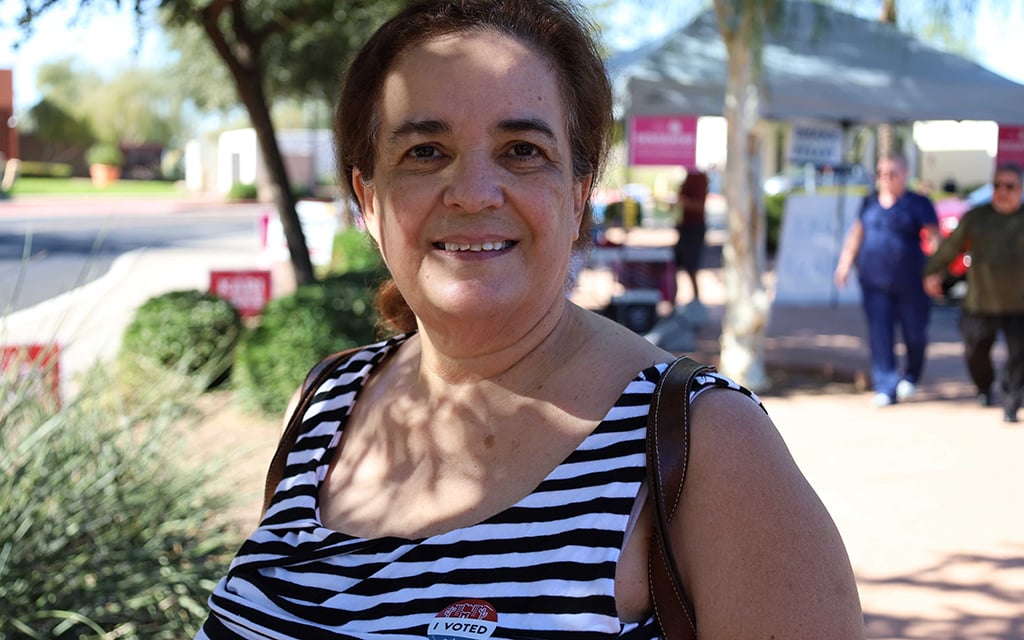
Nilda Candalario, 62, drops her ballot off at Surprise City Hall on Tuesday. Since she was a child living in Puerto Rico, Candalario has kept her family’s tradition of going to the polls in person on Election Day. (Photo by Chad Bradley/Special for Cronkite News)
It is a family tradition for Nilda Candalario to go to the polls in person every election. The Surprise resident remembers going with her father in Puerto Rico to vote when she was a child, and her mother always went too.
“I remember my mom died right after the hurricane (Maria), but she was the one that even if she was in a wheelchair, she used to go and vote in person. So that’s how our tradition is,” Candalario said.
Candalario can’t wait in line like she normally does because of knee issues, but that didn’t stop her from dropping off a ballot at Surprise City Hall on Election Day.
Candalario, who has lived in Surprise for three years, said she and her family lost their home during Hurricane Maria in 2017 – the Category 5 storm devastated the northeastern Caribbean including Puerto Rico. Even then, the Candalario family made efforts to vote.
Candalario said Surprise could benefit from having more polling locations.
“An extra voting place might be good, especially for the handicapped and you know, they just want to go in and vote in person,” Candalario said.
– Reporting by Alexis Waiss/Special for Cronkite News
Katie Hobbs urges ASU students in Tempe to vote

Arizona Democratic candidate for governor and current Secretary of State Katie Hobbs puts her signature on a sign that reads “What politics means to me!” on Arizona State University’s Tempe campus midday Tuesday. (Photo by Shane Brennan/Cronkite News)
Katie Hobbs, Arizona Democratic candidate for governor and current secretary of state, told students on Arizona State University’s Tempe campus that the gubernatorial race against Republican Kari Lake is going to be tight and that voters can’t be taken for granted.
Arizona attorney general candidate Kris Mayes and incumbent Arizona Superintendent of Public Instruction Kathy Hoffman, both Democrats on the ballot, also spoke briefly to a small crowd of students Tuesday midday and encouraged them to vote.
“American democracy runs through Arizona,” Mayes, who is an ASU graduate, told students.
The candidates appeared at an Election Day tabling event held by student political organizations Mission for Arizona and Young Democrats at ASU at ASU’s Memorial Union. Hobbs spent a short time on campus and then moved on to an event in south Phoenix.
– Reporting by Shane Brennan
Advocacy group posts members at polling sites, urging people to vote
“Si, se vota!”
Alexis Delgado Gania and eight other young adults stand on a sidewalk and shout this at cars passing by the Mountain Park Health Center polling site on Thomas Road in Phoenix.
Gania, 20, is a community organizer for the group Living United for Change in Arizona, which advocates for social, racial and economic progress. His job is to encourage people in Black and brown communities to vote.
LUCHA members are posted at polling locations across the state, also encouraging people to vote, Gania said. They are especially focused on Proposition 308, which would allow undocumented residents who have attended school in Arizona for at least two years to receive in-state college tuition. The proposition would make education more accessible for Dreamers, or undocumented people who were brought into the U.S. by their parents when they were children.
“This will ensure that they have an equal opportunity to accessible future education (and) be able to invest in their futures,” he said.
– Reporting by Alex Appel/Special for Cronkite News
Conservative volunteers toe the line, hand out information at the 75 foot mark
Patricia Romero and Erika Araiza were handing out pamphlets in Guadalupe and talking to voters about abortion, drug trafficking and immigration when they were reminded that they needed to stay 75 feet away from the poll.
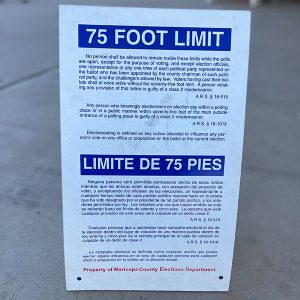
There’s a 75-foot perimeter around voting locations to “create a safe space to vote.” This sign is posted at the El Tianguis Mercado polling center on Election Day. (Photo by JaMirah Borden/Special for Cronkite News)
The reminder came from Alex Garcia, a member of Election Protection Arizona, which monitors polling places on Election Day to ensure voters have access. The reminder was not well-received. Romero said she felt threatened and began recording Garcia.
Araiza, 48, of Gilbert, said she and Romero were there to promote “a conservative approach.”
“Democrats want to kill babies,” she said.
Romero, 59, of Mesa, added that she’s concerned about fentanyl from China crossing into the U.S. from Mexico.
Later, a young man wearing a Kari Lake for governor T-shirt joined the women at their table, which was set up close to the 75-foot marker. He did not want to be photographed or interviewed.
There’s a 75-foot perimeter around voting locations to “create a safe space to vote,” according to the Arizona Secretary of State’s Office. Only voters, election officials, credentialed party observers and U.S. Department of Justice observers are allowed inside the 75-foot perimeter.
– Deanna Pistono/Special for Cronkite News
Voter recounts poll watcher intimidation
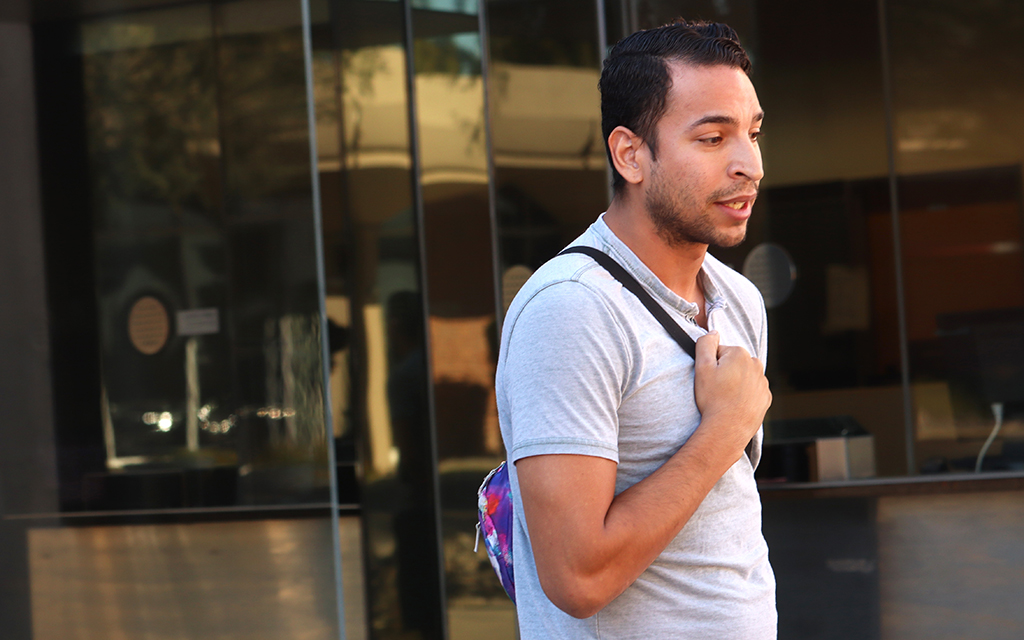
Daniel Ruiz, 28, of Glendale, said a poll watcher confronted him shortly after he dropped off his ballot at Glendale Community College. Ruiz said he felt intimidated and thrown off by the experience. (Photo by Omar Waheed/Special for Cronkite News)
Daniel Ruiz, 28, has voted since 2016, but this was the first time he had a poll watcher shove a camera in his face.
“I’m gonna have some problems with that. I don’t know who you are,” he said after trying to confront the poll watcher. The other man didn’t ask for permission and refused to say who he worked for. He left quickly after taking photos of Ruiz and nonpartisan Election Protection volunteers at the college.
A federal judge last week set limits on groups watching ballot drop boxes. U.S. District Judge Michael Liburdi ordered them to halt filming and confronting voters, carrying weapons and to correct voting misinformation on social media. The judge’s order remains in place until a week after Election Day. Groups must be at least 75 feet away from ballot drop boxes.
Besides the encounter, Ruiz said he was able to drop his ballot off and everything went smoothly.
“We’ve got a lot of things on the line,” Ruiz said, naming public education and women’s rights as important issues.
This midterm is important to him even though the atmosphere has changed.
“I feel like, weirdly, if people don’t get their way, things can escalate, and that’s kind of scary for a regular citizen,” he said.
– Reporting by Khanh Nguyen/ Special for Cronkite News
Disability doesn’t detour one Arizona voter
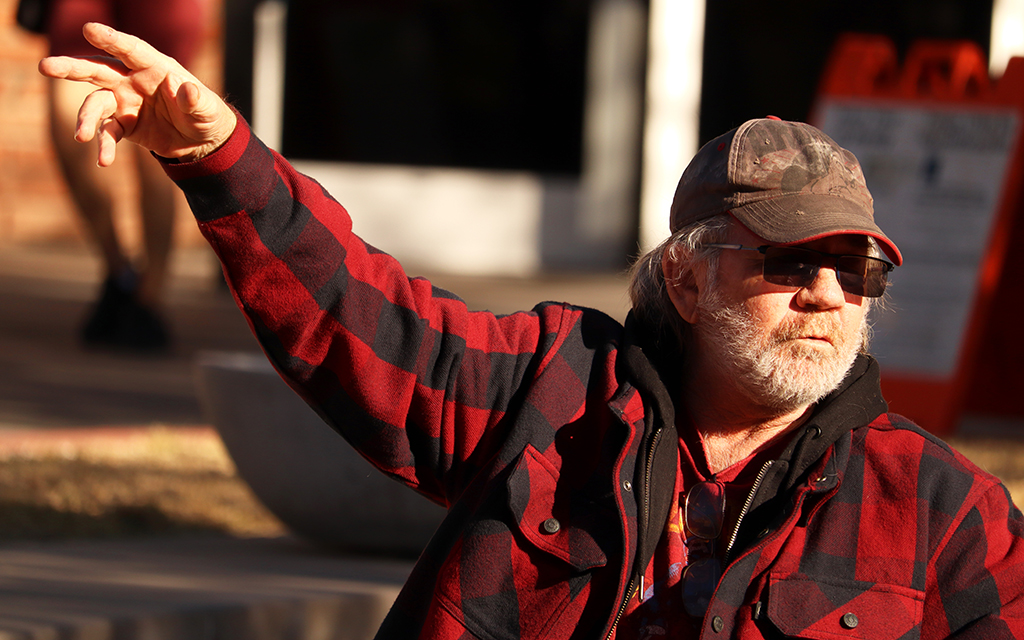
Danny Reese, 60, of Glendale, went to Glendale Community College twice to drop off his ballot. Reese said accessibility isssues caused him to circle the college a couple times to find a more accessible point. (Photo by Omar Waheed/Special for Cronkite News)
Danny Reese, 60, arrived at Glendale Community College to drop his ballot off, then realized he forgot his proof of residence. He went home and came back to cast his ballot. The Glendale resident was disabled two years ago and uses a cane to help him get around.
“It would’ve been nice if they’d let you know that the handicap was up here,” he said. Reese had parked far away, where there was no signage directing him to the closer handicap parking. He did not know that curbside voting was available.
All polling locations in Arizona are required to have machines that voters with disabilities can access.
Reese usually votes by mail, but he changed addresses recently, and the new one was not on file. He had to vote in person for the first time. Despite the difficulties of the morning, he was determined to vote.
“You ain’t gonna have nothing out there if you don’t try,” Reese said, who’s most concerned about lowering hospital bills. Proposition 209, which is on the Nov. ballot, would cap interest rates at 3% for medical debts.
– Reporting by Khanh Nguyen/Special for Cronkite News
Mother shares the experience of voting with her daughter
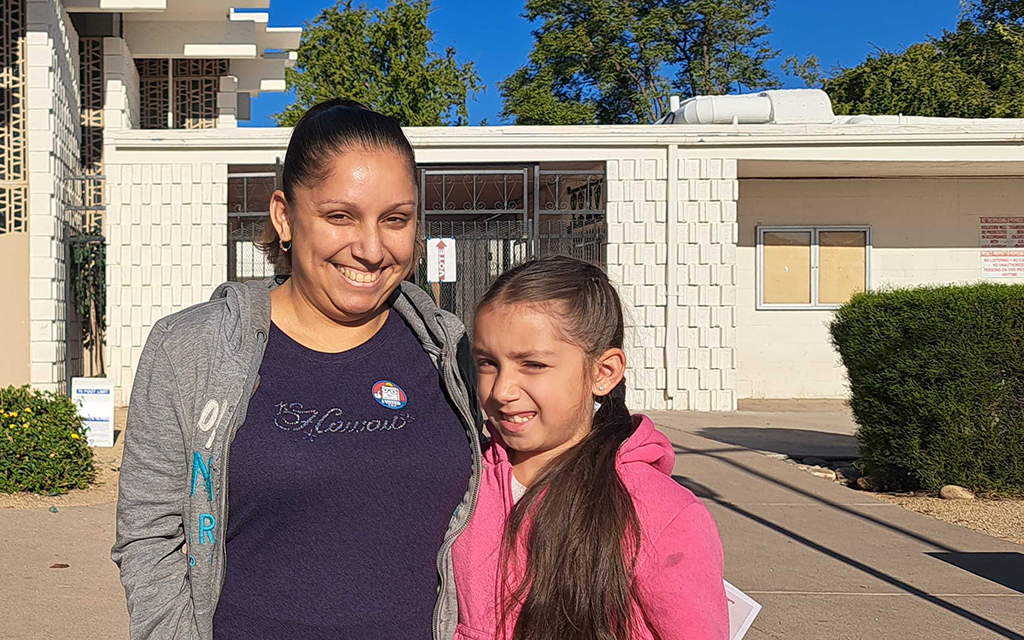
Victoria Medina, right, tags along with her mother Vanessa Figueroa to the polls on Tuesday. This is Victoria’s first time going to a polling place, and her mother thought it would be a valuable experience. (Photo by Shelby Rae Wills/Special for Cronkite News)
Vanessa Figueroa brought her daughter, Victoria Medina, 9, with her to the Maryvale Bridge United Methodist Church in west Phoenix to drop off her ballot.
Figueroa, 39, said she thought it would be a good chance to teach her daughter the importance of voting.
“(I want her to know that) you get to vote and give your opinion and decide for your own education, too,” Figueroa said.
Figueroa said voting is one way she can express her support for public education. Victoria hasn’t been able to see a school counselor, she said, because of short staffing – one indication that schools, she said, need more resources.
– Reporting by Alex Appel/Special for Cronkite News
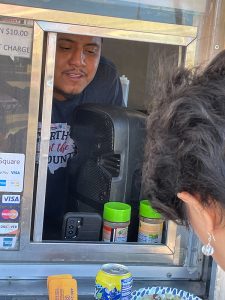
Food truck owner Tomas Martin hands out free food and drinks to voters in Guadalupe on Tuesday. (Photo by JaMirah Borden/Special for Cronkite News)
Food truck employee hands out free tacos
Tomas Martin was handing out free tacos Tuesday morning in Guadalupe.
He said he was hired by the Arizona Democratic Party to give out tacos to anyone who voted, regardless of party affiliation, so he parked his Pokys Cocina food truck outside of El Tianguis Mercado and got to work.
Martin, 33, said he’s as nonpartisan as his tacos. He isn’t registered to vote and he isn’t affiliated with any political party.
“No matter who or what you are, just come on up,” he said.
– Reporting by Deanna Pistono/Special for Cronkite News
Volunteer works to get out the Indigenous vote
Angela Willeford, 42, passed out breakfast burritos and T-shirts as the sun rose over the Salt River Pima-Maricopa Indian Community Center.
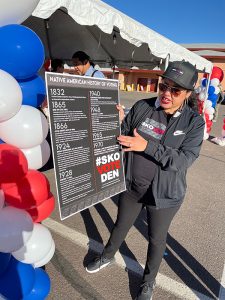
Angela Willeford explains the history of voting rights at a polling location on the Salt River Pima-Maricopa Indian Community on Tuesday. (Photo by Emma Petersen/Special for Cronkite News)
“It’s Democracy Day!” she said to voters as they headed in to vote.
Willeford, a member of the Salt River Pima-Maricopa Indian Community, spends a lot of her spare time working to get out the Native vote.
“That’s what democracy is about, making sure we’re celebrating voting and encouraging our community members to step up, whether you’re Republican or independent or Democrat,” she said. “We want you just to participate in the process.”
That’s all the more important for Indigenous people, who were long denied the right to vote, Willeford said. Even after the U.S. Supreme Court confirmed that right, Arizona imposed literacy requirements, which excluded many Native Americans, until the 1970s.
– Reporting by Lauren Irwin/Special for Cronkite News
Native Vote volunteer excited by high voter engagement
“This is my Super Bowl,” Jessica Aguilar, a volunteer for Native Vote, told a reporter at El Tianguis Mercado in Guadalupe. The organization is nonpartisan and aims to help and educate voters.
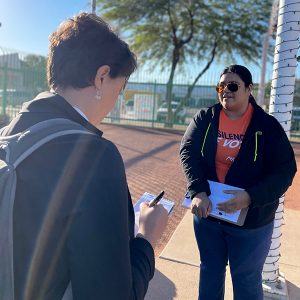
Jessica Aguilar, a volunteer with Native Vote, assists voters if there is a problem. The organization is nonpartisan and aims to help and education voters. (Photo by JaMirah Borden/Special for Cronkite News)
Aguilar, who has a degree in political science, said she saw more voter engagement this year than in the 2020 election, although most voters she interacted with were dropping off ballots they already had filled out.
Aguilar volunteered with Native Vote during the last election at the same polling place.
Though not Native American herself, Aguilar said she volunteers to support her friend, who is.
Aguilar, who was stationed near a group of conservative women handing out pamphlets near the 75-foot line, said she is “happy to provide voter education.”
– Reporting by Deanna Pistono/Special for Cronkite News
Local volunteers offer resources to people facing discrimination at polls
Volunteers for Election Protection Arizona were stationed at a table outside the Knights of Pythias in Tempe when the polls opened Tuesday.
Their job is to ask voters whether they are having any issues casting their votes and to provide translating services for voters who need it.
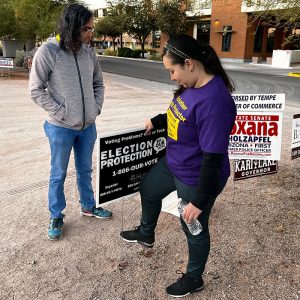
Election Protection Arizona volunteers set up signs outside the Knights of Pythias in Tempe to let voters know to report any issues they might have while voting. (Photo by Isabel Garcia/Special for Cronkite News)
They said they first showed up to a polling station at Phoenix College, but when they got there, they learned that it was no longer a polling site.
If a voter is having trouble, such as not showing up on the registration list, or if they feel they are being intimidated, the volunteers work with election officials to resolve the problem.
One volunteer, who did not want to be named, noted that the service is important during such a polarized election.
“We’re seeing an increased number of political violence and voter intimidation, and it’s important to keep elections fair,” he said.
Voters can report discrimination or intimidation at polling locations by calling 1-866-OUR-VOTE or 1-866-687-8683.
– Reporting by Erin Hall/Special for Cronkite News
‘I feel like this is my jury duty’, poll worker says
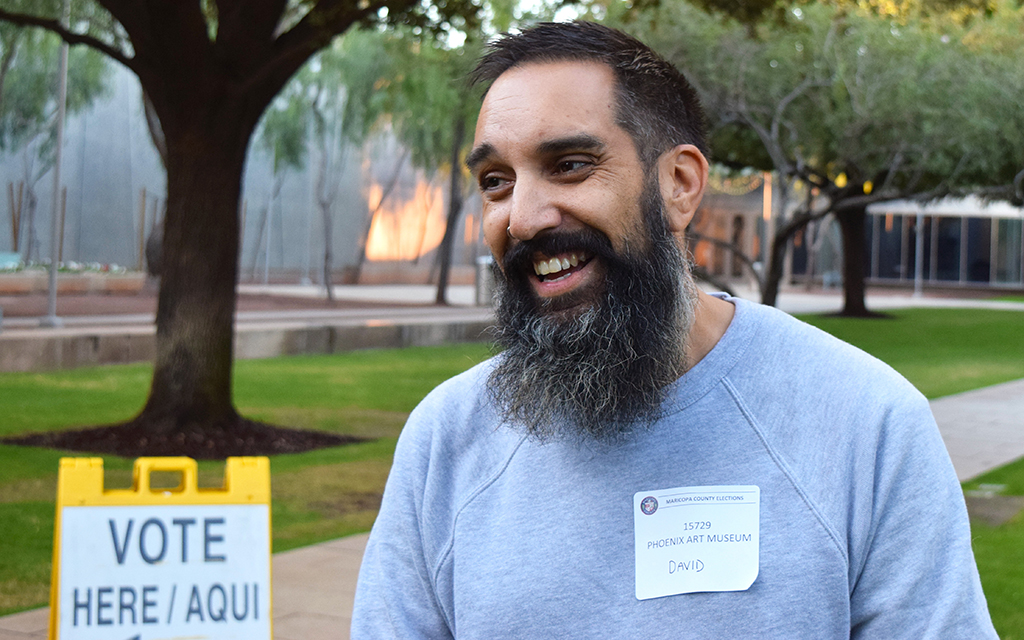
Poll inspector David Duran speaks outside the Phoenix Art Museum on Tuesday. In his second year as an inspector, he said he believes it is a civic duty to work the polls. “It’s important that we have different representation of different people working at the polls,” Duran said. (Photo by Albert Serna Jr./Special for Cronkite News)
David Duran, 42, has volunteered as a poll worker for more than a decade.
He said the older he has gotten, the more he has become interested in politics, but he still avoids working on campaigns. Instead, he serves as an inspector on Election Day.
He’s essentially the head volunteer and watchdog for the Phoenix Art Museum polling location, managing election judges and clerks.
Contributing to his community is important to him.
“I hate to say this, but I’ve never been called for jury duty,” he said. “So I feel like this is my jury duty.”
– Reporting by Francesca D’Annunzio/Special for Cronkite News
He’s in his 80s – and he was the first in line to vote on Election Day
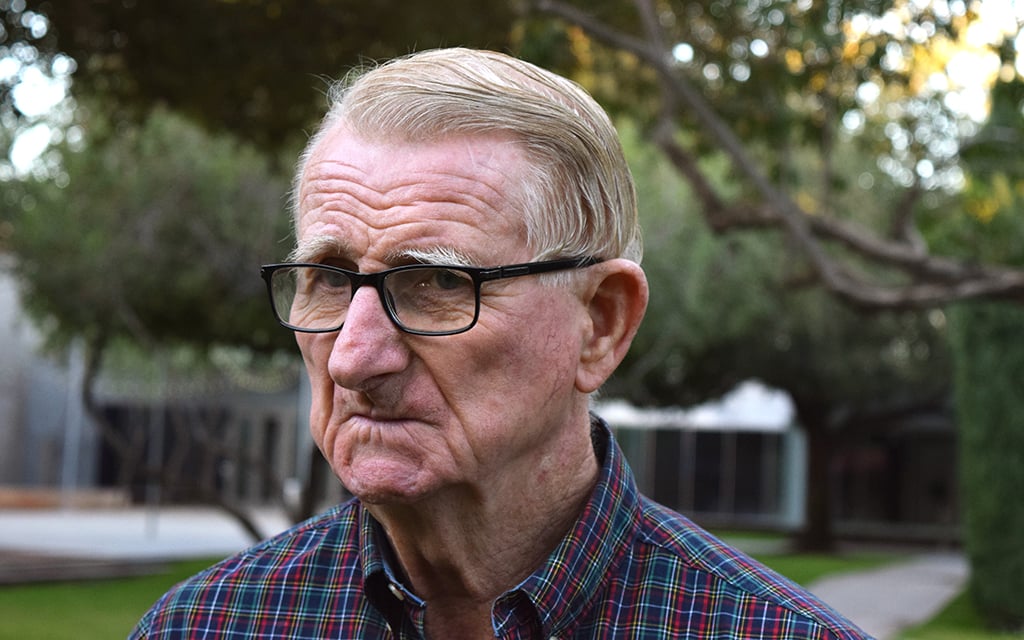
Don Newton stands outside the Phoenix Art Museum in downtown Phoenix on Tuesday. Newton was the first person to arrive to the polling location, casting the first ballot of the day. (Photo by Albert Serna Jr./Special for Cronkite News)
Don Newton was up at 1:15 a.m. He had two tasks: watch the lunar eclipse and vote in the 2022 midterms.
He got to the polls before 6 a.m., and cast the first ballot of the day at the Phoenix Art Museum. Newton, who is in his 80s, said he has been voting for more than six decades.
“I’m trying to be a responsible citizen,” he said. “It means everything. Well, getting to heaven means everything but it’s critical; it’s our duty; It’s our responsibility.”
Newton said he has faith in the voting process and trusts poll workers.
“I got the impression these people make a serious effort. I saw them take an oath when they were in there,” he said.
– Reporting by Francesca D’Annunzio/Special for Cronkite News
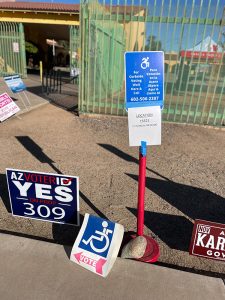
Accessibility and curbside voting signs outside polling places help voters with disabilities cast their ballots. This sign indicates the service outside a polling place in Guadalupe. (Photo by JaMirah Borden/Special for Cronkite News)
Curbside voting provides access
Mary Ellen Barker is waiting for open heart surgery, but she still made sure to vote Tuesday.
A friend, Patrick Lomas, went with her to a polling location in downtown Phoenix, and she was surprised to discover curbside voting was available. With curbside voting, poll workers help voters with disabilities cast their ballots without having to leave their car.
Barker, 64, said she made the effort to vote despite her illness because she is convinced this election is a critical one.
“We’re sinking if we don’t change what we’re doing,” she said.
– Reporting by Jordan Gerard/Special for Cronkite News
LGBTQ rights motivate one voter
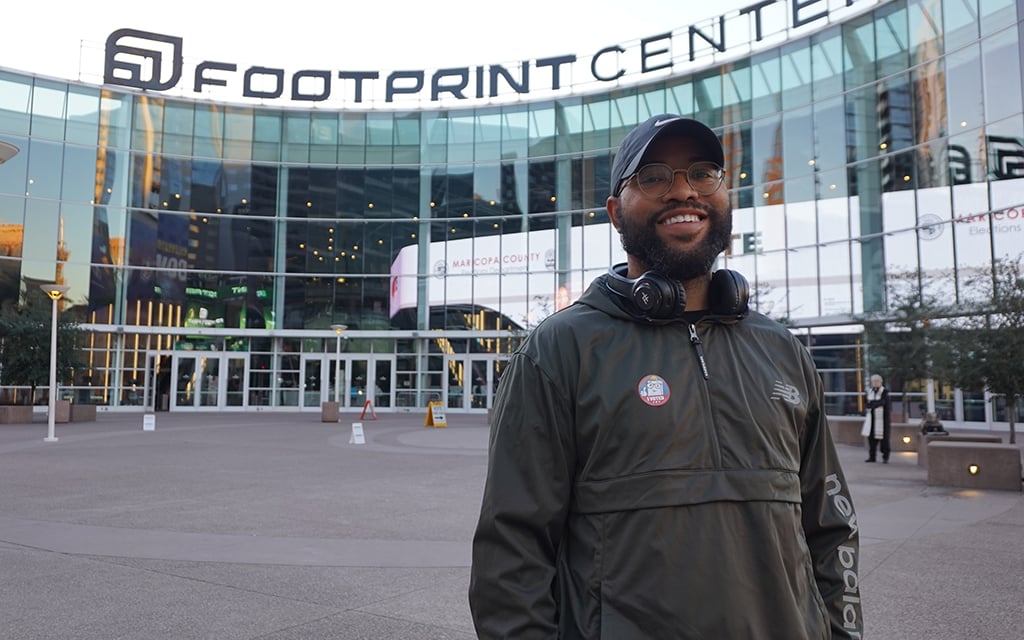
Aaron Taliaferro votes at the Footprint Center in downtown Phoenix in the early hours of Election Day. As a gay Black man who works with LGBTQ+ youth, he said protecting rights for gay and transgender people brought him to the polls. (Photo by John Leos/Special for Cronkite News)
There was no way that Aaron Taliaferro, 41, was going to miss out on voting in the midterm election.
He said there’s too much at stake for a gay, Black man like himself. Candidates have taken stances on LGBTQ+ issues that he cares about, and he worries about their rights being restricted.
So he was early in line to cast his ballot at the Footprint Center in downtown Phoenix before heading to the gym.
– Reporting by Jordan Gerard/Special for Cronkite News
Mesa voters are mixed on election security
“The polls are open! The polls are open!” shouted a poll worker at 6 a.m. sharp.
It was still dark when the 40 or so people in line to vote at Mesa Community College filed into the college’s Mesquite building.
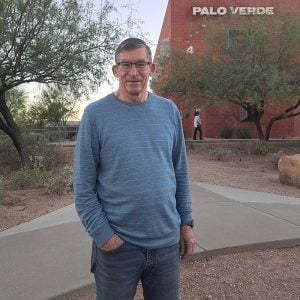
Verl Farnsworth, 80, of Mesa, says instead of sitting at coffee shops and complain, people should come out to vote. “If you don’t vote, you cannot complain,” Farnsworth said. (Photo by Odom Rithy/Special for Cronkite News)
Lisa Mueller, 57, was the first to cast her vote. She said she got in line at 5:40 a.m.
“I wanted it to be counted,” she said when asked why she decided to vote in person. She is one of many Arizonans who believe there was fraud in the 2020 presidential election.
Verl Farnsworth, 70, also said casting his ballot in person was the only sure way to have his voice heard, and he feels a lot rides on his choices.
“It matters to my 13 children and 40 grandchildren that their liberties are protected,” he said.
Joe Likovich, 60, had a different reason for voting in person: He said his ballot never forwarded to his correct address. He said he doesn’t worry much about fraud.
“I don’t think anyone could have represented me besides me,” he said.
– Reporting by Morgan Casey/Special for Cronkite News
Voter with mobility issues sits in long line waiting to vote
Sharon Willocks ended up sitting on the ground while waiting in line to vote near Biltmore Fashion Park in Phoenix. She’s a cancer survivor who has had spinal surgery, which has left her with a bad back.
“It would have been nice to have some chairs,” she said.
Usually, Willocks votes by mail. But this election cycle, she wasn’t able to get the paperwork in on time. In-person was her only option. She said she waited at least 20 minutes in line, which was too much for her back to take.
Once she got inside the polling place, Willocks had an easier time. Poll workers gave her a chair in another room so she could take a seat while she filled out her ballot, she said.
Without that, “it would have been really, really tough,” she said.
Still, Willocks will stick to voting by mail in the future.
“At the last minute, I wound up coming here, and I’m not going to do this again.”
– Reporting by Caitlin Thompson/Special for Cronkite News
Voters say polling machines are down in south Phoenix
Within half an hour of the polls opening Tuesday at a voting location on east Baseline Road, voters said the machines weren’t working.
Elizabeth Lynn Tompkins, 62, and Juan Araujo, 65, both of Phoenix, said the machine they were using spit out their ballot four or five times. They kept getting messages that their ballots were misread.
As they struggled with the machine, a line started to form behind them, and they asked a poll worker for help. They were told to place their ballots in the misread ballot dropbox, they said.
“So we saw our ballots are sitting in some box with everybody else’s, never having gone through the machine,” said a distressed Tompkins. “The machines are not working.”
Tompkins and Araujo came to vote in person because they wanted to make sure their votes counted – something they can ascertain by Friday by going to the Maricopa County Be Ballot Ready website. Or they could return in an hour to try again.
“All we can do is pray because something is not right,” Tompkins said.
– Reporting by Megan Swing/Special for Cronkite News
Voter reflects on importance of midterm elections, concerns over electronic voting
At 6 a.m., Phoenix resident Katherine Hills, 64, stood in line to vote at Biltmore Fashion Park. The line, she said, wasn’t nearly as long as the one in 2020 when it wrapped around buildings.
Still, she thinks this election is just as important “because you have so many polarizing opinions and candidates.”
Hills has been involved in politics for most of her life, attending President Lyndon Johnson’s 1964 inauguration on the shoulders of her father. She worked as a staffer on Capitol Hill for a U.S. Congressman from Michigan and campaigned for Jimmy Carter in 1976.
The change in the political climate, she said, has been alarming. “It saddens me – the state that things are in right now,” she said.
When she came out of the polling place at 7:10 a.m., Hills said she was concerned about the electronic sign-in process and had filed a complaint that a voter’s birthdate and address are visible to those standing nearby. In addition, she was worried about the lack of manual backup for filling out ballots.
“I work on databases for a living, so I have no faith in any database that’s run by the government,” she said. “I think you should always have a manual backup in case the power goes down.”
– Reporting by TJ L’Heureux/Special for Cronkite News
Polls open across Arizona
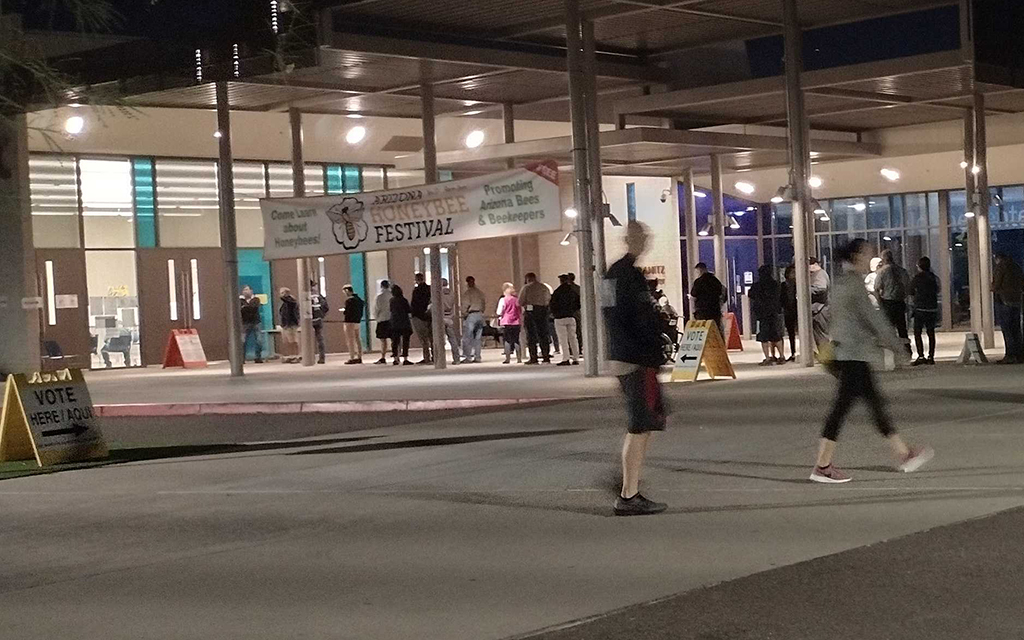
Long lines greet voters early Tuesday at Paradise Valley Community College before polls even opened. (Photo by Duncan Schultz/Special for Cronkite News)
Campaigning and canvassing efforts were high this election, which political operatives hope will spur more of Arizona’s 4.1 million registered voters to turn out.
Sen. Mark Kelly, Democrat of Arizona, has the second-most-expensive campaign of all congressional candidates in the 2022 election, spending $75,930,846, according to the Federal Election Commission.
Turnout in Arizona generally is lower for midterms than presidential elections, according to the Secretary of State’s Office.
As of Monday morning in Arizona’s most-populous county, Maricopa, 965,000 ballot packets already had been received and signature-verified, County Recorder Stephen Richer said in a news conference.
“We expect that we’ll have about 1.6 million voters in Maricopa County for this November general election,” he said in an interview with Arizona PBS.
He said results from ballots received before Saturday will be released at 8 p.m., with Election Day results to follow.
“Some people want to hold onto their ballot until the bitter end – they all count, it’s just a matter of when they count,” Richer said.
Although many Arizonans have voted early, registered voters will have until 7 p.m. Tuesday to cast their ballots – anyone in line by 7 will be allowed to vote.
Maricopa and most other counties allow voters to vote at any voting center, but check with your county recorder office for specific rules.
To find out where to vote, visit my.arizona.vote or the website for your county recorder.
In-person voters will need to provide one or two forms of identification, depending on the form provided. A list of acceptable identification can be found on the Arizona secretary of state’s website.
– Reporting by Scianna Garcia
